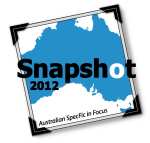
QUEENSLAND writer Scott Robinson grew up reading and writing science fiction and fantasy — he was writing ‘novels’ when he was 10 years old. “It was never short stories, strangely enough,” he says, “but at 13 was sure I was going to make my living as a poet when I had poems published in Quadrant. Twenty-five years later, and I’ve barely made a couple of weeks’ worth of wages from any sort of writing at all.”
Last year, he made one of his books available for free as an e-book and has since self-published four on Amazon — the first three books of Tribes of the Hakahei (The Space Between, Singing Other World and When the Times Comes), as well as a stand alone crystal-punk fantasy call The Brightest Light. The final book in the Hakahei series, A Different Kind of Heaven, is pending.
Scott lives with his pregnant wife and two children. His website is www.scottjrobinson.com.
What have been the joys and sorrows of the self-publishing route?
Joys: my books is out there in the world for people to read. I’ve had some great feedback from readers and really can’t get enough. The sorrows: not as many people are reading them as I would like.
Marketing has always been a problem for self-published authors, but these days I have to be compete against the good stuff out there as well as fighting the negative image created by the ‘writers’ who decided to knock up a book over the weekend and make their fortune. At least in the old days, the wife or husband or other keeper of the funds was something of a gatekeeper. Now, it takes no time or money as all to publish a book. Apparently, for some, it doesn’t take any effort, either. So, I just keep hoping for some word of mouth to kick in (The Brightest Light got a great review on Amazon the other day) while I work on the next book.
Some varmint tried to purloin your free book through Amazon. How did you handle that and has it affected the way you look at e-publishing?
My first port of call in that instance was an email to Amazon. I received an auto reply saying someone would contact me in three working days. When that didn’t happen ,I sent another email. Eventually, after a week or two, I initiated a live chat with Amazon customer service (or someone like that) and spoke to them. The book was taken down a couple of days later.
I don’t think it changed my view on self-publishing. I actually brought forward my move to Kindle because of that. Piracy is something that could happen to everyone and it may have been a bit of a compliment that someone went to the effort (though not a lot — the conversion was terrible) to steal my work.
You like to mix ‘n’ match your genres: has this worked for you or against you when shopping around the stories?
Against me, of course. 🙂 The writing and the stories and everything else are great — it’s just that the editors can’t fit them into an easily marketable niche. It sounds nice and I’ll keep telling myself that.
What Australian works have you loved recently?
I actually haven’t read a lot of anything recently. I’ve been working on novels pretty solidly for about six months — getting ‘completed’ one’s ready for Amazon and finishing off No 4 in the Tribes of the Hakahei series. Unfortunately for me, I do my writing and reading in the same head space so they can interfere with each other quite dramatically.
The last one I read was probably Business of Death by Trent Jamieson. It’s not really my kind of story, but I flew through it anyway (by my standards) and could definitely see the quality.
Some of my favourite Aussie stuff from years ago would be Souls in the Great Machine and sequels by Sean McMullen. Or the Parish Plessis books by Marianne de Pierres. I also enjoy most of the stuff by Sean Williams.
I have also been trying to get around to The Sentients of Orion series and King Rolen’s Kin <by Rowena Cory Daniells> for a while. And recent releases Roil (by Jamieson) and Debris (by Joanne Anderton). Just not enough hours in the day
I can’t wait to make use of my Kindle and try to support some indie writers, hopefully some of who will be Australian. It’s always great to discover someone new and if nobody else knows them, it’s even better.
What have been some of the biggest changes in Australian speculative fiction in the past two years since Aussiecon 4?
Because of my slow reading (slow even when I’m not writing) and the fact that I don’t attend cons (or Vision Writers) any more (lack of money and two young kids to look after and feed), I probably don’t really follow Australian spec fic as something separate to spec fic in general. I just read what I read without thought to where it came from. But the changes here are probably the same as everywhere else and stem from the ease of self-publishing e-books. Or publishing them even if they aren’t yours. I think it’s a great thing but will be even better when the world comes up with a way to weed out the ‘first draft, I don’t need an editor’ type writers because they make it much harder for those of us who do care.
THIS interview was conducted as part of the 2012 Snapshot of Australian Speculative Fiction. We’re blogging interviews from 1-8 June and archiving them at Australian Speculative Fiction in Focus. You can read interviews at:


Pingback: Snapshots! Part Twenty | Refracted Ambiguity with Polar Bear
Pingback: 2012 Snapshot Archive: Scott Robinson | Australian SF Snapshot Project